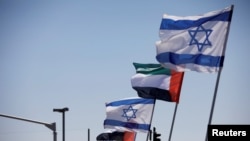A senior Israeli official on Wednesday expressed hope that Israel’s relationship with the United Arab Emirates (UAE), now secured in a peace accord, could serve as a model for engagements with Arab nations beyond the security domain.
“Some dates, you just remember,” the Embassy of Israel in the United States wrote on Twitter this week, with pictures marking the three peace deals Israel has secured with its Arab neighbors – Egypt in 1979, Jordan in 1994 and UAE in 2020.
Addressing a virtual online news conference from Jerusalem, Eliav Benjamin, director of the Coordination Department of the Israeli Ministry of Foreign Affairs, said his country holds each peace agreement “very close,” then described the accord with UAE as more full-fledged, citing seven working groups the two countries have recently established to “put content into the relationship.”
Although trade, investments and delegations going back and forth have been missing from Israel’s relations with Egypt and Jordan, many of those activities were “already happening” with UAE, Benjamin said Wednesday at the briefing. “We were just all waiting for this to be public.”
In addition to helping “companies that want to do business and tourists who want to travel,” Benjamin said Israel and UAE will work together to combat COVID-19 as well as future pandemics.
While the U.S.-brokered Israel-UAE accord was a surprise when it was announced last month, Benjamin said his country had worked on the deal for two decades, most intensively in the past four years during which two events were significant.
In 2017, Israel opened a formal mission in Abu Dhabi, the UAE capital city, Benjamin said. The mission was accredited to the International Renewable Energy Agency.
In May 2019, UAE formally invited Israel to set up its own pavilion in a world expo planned for October 2020. The expo has been postponed to October 2021 due to COVID-19.
Asked when the official signing ceremony would take place for the accord, Benjamin said the White House will select a date, which recognizes that Israel and the U.S. worked “hand-in-hand” on the accord with UAE.
Israel, he said, is “hoping, waiting, striving” for similar accords to be reached with other Arab neighbors, not the least Saudi Arabia, a key player in the region and beyond.
While acknowledging there have been “developments” on the Saudi front, he added that Saudi Arabia would “not necessarily” be the next Arab nation to establish formal ties with Israel.
Meanwhile, in a signed article published in the Israeli media, UAE’s longtime Ambassador to the United States Yousef Al Otaiba described the agreement between his country and Israel as “unlock[ing] a gate toward a better future across the Middle East.”
He pointed out that an equally important feature of the accord is that it “closed the gate on annexation and created new dynamics in the peace process,” referring to Israel’s earlier publicized intent to annex – or, as the Israeli government put it, exercise sovereignty in territories in the West Bank occupied by Jewish settlers but which have been contested by Palestinians as their land.
Al Otaiba wrote that his country hopes the accord with Israel “will help move the region beyond a troubled legacy of hostility and strife to a more hopeful destiny of peace and prosperity.”
A spokesperson from the Israeli Embassy in Washington told VOA on Wednesday that “Israel remains committed to the United States Peace Plan as it was outlined by President Trump in early 2020. Moving forward with our relation with the UAE and hopefully with more countries to come doesn't change our commitment.”
Since the Mideast peace plan put forth by the Trump administration includes the idea of a Palestinian state, Israel’s commitment to the plan in theory commits it to an independent Palestinian state.
Benjamin, the Israeli official briefing reporters from Jerusalem on Wednesday, emphasized that Israel wants its peace agreement with the UAE be viewed on its own merit, and not through the Israel-Palestine prism, noting the overall peace plan is much broader than the Israel-Palestinian question, “it’s what’s going to happen in the Mideast at large.”





